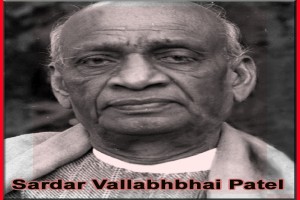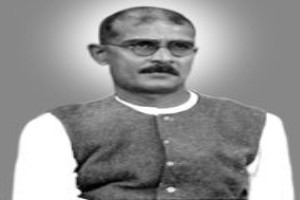
With Sardar Patel in Tamilnad – Part 2
 By Mahadev Desai*
By Mahadev Desai*
(This article was published in Young India on September 12, 1929)
“…a propaganda of hatred is no movement of self-respect”
Among the Students
The mirasdars and landholders have been meeting him everywhere, and are anxious to get his guidance and direction in the matter of land revenue. How much they will be able to to do is yet to be seen, for he has begun his tour in the moffussil only from today. But he has already won the hearts of the students. The Presidency College students want him, the Loyola College students capture him, the Youth League organises a special meeting and finds the famous Gokhale Hall too small for the crowds of young men anxious to hear him. And does he win them with words full of honey, and eloquence that thrills but does not stir to action? No, he delivers sledge-hammer blows in the style of the Lokmanya and sweeps the youth off their feet. ‘What is the use of your oratory? It has no meaning, for you never want to give effect to your words,’ he tells them and the students loudly cheer him. “The atmosphere of the presidency is surcharged with poison, hatred, bitterness, distrust and suspicion,” he tells them. “In three days I am choked to suffocation. It is nauseating to read your newspapers. It gives me shivers and shocks. I want you to fight this devil of communalism.” He comes in for his share of violent abuse in the local communalist papers, but the boys want to hear more from him. “You hear of self-respect movements,” he says without mincing matters. “Well, then, I tell you, a propaganda of hatred is no movement of self-respect. Any movement, that makes you out to be a backward community and therefore must be helped by favours, is no movement of self-respect but a movement of self-degradation. How long are we going to be backward, if we are backward what is the remedy? If we are in a big majority why should we be afraid of a small minority? Let us be ashamed of having anything that we do not deserve, ashamed of having anything except by our own merit.” And there is vociferous cheering from the young non-Brahmin students.
Also read: History Recalled: He came, he saw, he conquered
But I may not take extracts from speeches which in cold print fail to convey the spirit in which they were delivered. All I should like to say, at the end of this the Sardar’s first week in Madras, is that it would be a surprise to me if his tour in the province does not set the masses of the province and the youths on fire.
September 19, 1929
A look at the Madras papers of the last fortnight might give the reader an impression that Shri Vallabhbhai Patel had gone to Tamilnad to fight the forces of communalism. But he had no such thing in mind. Accustomed to talking straight and not mincind matters, he came face to face with exploitation in various forms and he delivered frontal attacks on them wherever he went. “We have been exploiting Gandhiji all these years, and I want to put my foot down on that exploitation. Let us be honest, let us not ask him to be at the helm of our affairs if we do not believe in his programme. I have not the slightest doubt in my mind that our salvation must come through the old non-co-opeation programme which within a year’s working of it had shown us visions of Swaraj. It had created an atmosphere of purity before which even the scoundrels quailed and did not dare to behave improperly. But we gave up that programme, and for six years have had another programme which has done nothing but bring to the surface corruption, selfishness, hypocrisy. That programme has been played out. The brilliant work of the President of the Assembly and his rulings have not helped us. Not a screw in the Government machinery is loose, and instead of looking to the Congress and the constructive programme for our salvation, we have come to look to the legislatures. We must end this state of affairs. But if we cannot, and if we must work the legislatures, let us work them honestly, let us solve at least the two problems of land revenue and prohibition. But there I am face to face with another form of exploitation. In the name of the self-respect movement, in the name of social reform, I see that the ignorant unsophisticated non-Brahman masses are being exploited. The foundations of their belief and their faith are shaken, and the youth are being nurtured on caste hatred and hatred of everything that Hinduism all over India holds sacred. Do you want to isolate yourself from the rest of India? Your politicians want provincial autonomy in Congress matters, and you want a licence to keep on fighting. I tell you, it is nothing short of suicidal. Take it from me that all who stir up the forces of hatred will have to answer before God. But even here if you feel that you must fight, I implore you to bury the hatchet for one year, I implore you to forget your differences and work hand in hand with the Brahmans. Bardoli has already prepared the ground, and with a slight effort you have simply to reap the harvest. Government dares to go on with resettlements, simply because it knows that in the Council you have no strength and outside you are busy fighting communal battles. For Heaven’s sake give up the squabbles and unite.” This, I think, is a fair summary of Shri Vallabhbhai’s speeches in Tamilnad, but his pitiless vision of naked reality was too much for the communalists, and their organs indulged in vulgar and vehement abuse of him.
The rousing receptions that he received everywhere and the talks he had with non-Brahmans at every place he visited proved that the abuse had not touched those for whom it was meant, and the only effect it had on Shri Vallabhbhai was that he rubbed in what he wanted to say with greater persistence and vigour. Youngsters were put up at various meetings to disturb the proceedings in the name of the ‘self-respect movement’. In Trichinapoly they handed in a note full of vile abuse not only of Shri C Rajagopalachariar who seems to be the chosen target of their poisonous arrows, but even of Shri Shrinivas Iyengar and the Rt. Hon’ble Shrinivas Shastri. ‘I refuse to take notice of questions couched in filthy and abusive language,’ he sternly said, and poured out an utterance full of righteous indignation which will be remembered not only in Trichinapoly but wherever the columns of The Hindu are read: “Those who are nurturing young men of this presidency on class hatred, mutual distrust and suspicion, are guilty of a crime for which they will have to answer before God. I am charged with borrowing my opinions from my Brahman friends whose company I am asked to avoid. I want those non-Brahmans to come forward in public or private to point out the spots in the character of my Brahman friends. They may get angry when I call them spotless, but abuse is no argument. If there are no Brahmans with whom you can agree, if all Brahmans as a class are bad according to you, I must say there must be something wrong with you. Every community has its black sheep. Have you ever ventured to point your finger at a foreigner if he is a bad man? Today the whole administration is in the hands of a handful of foreign Brahmins. You are prepared not only to tolerate them but to worship them. You feel proud of associating with them, but are ashamed of your own countrymen. I want, if it is in my power, to wean young men from this poisonous propaganda. I am told that there is a class of people here who claim superiority by birth. I do not believe in such superiority. In a land where Ramanuja had a non-Brahman Guru, why should I feel disturbed? If I am pure, if I do not do anything wrong, why should I be disturbed by others claiming superiority over me? It is open to me to claim my own position, but let no one forget the foreigners’ claim of superiority over both Brahmans and non-Brahmans. I pray to God that your leaders may understand that they are misleading young men and that they will be leaving a legacy for which they will repent in the years to come. To the young men I say, avoid reading poisonous newspapers. They are walking plagues. Do not read them, even if they abuse only your enemy. Understand that to abuse or to hear abuse is a crime. The man who wants to be brave to fight for his country never indulges in or tolerates abuse.”
But the particular section that indulged in the abuse evidently does not want a fight, even in the matter of land revenue, and the infuriated organ claiming to speak on its behalf went the length not only of suggesting that everything was well with non-Brahman politics but that Shri Vallabhbhai’s help and guidance in land revenue agitation were not wanted and that his presence in the presidency was a ‘curse’.
Which of the two – Shri Vallabhbhai’s presence or the poisonous propaganda – was a curse was effectively shown by the desire expressed everywhere for guidance on the question of land revenue, and by the youths flocking to see him everywhere. Mirasdars at every place saw him, and those in Madras are already concerting measures for a presidency land league. Soon after the meeting in Trichinapoly was over the youths who had interrupted him crowded round his car asking questions. “Tell me, first,” asked Shri Vallabhbhai, “who teaches you this propaganda of hatred and abuse?” “Our South Indian leaders,” was their reply; “we are sorry, but we would like you to answer a few questions.” “Yes, you may come to me,” said he. “But, sir, if we write in the newspapers, would you not reply?” “I don’t read your newspapers. Why not write to me a letter?” “But if we write to Young India?” “Yes; then you are sure to have a reply, if you imitate the spirit and tone of that paper.” “Thank you, sir,” said the youths and dispersed with “three cheers for our non-Brahman leader Sardar Vallabhbhai Patel!”
The Youth League at Salem – all non-Brahmans – not only invited the Sardar to receive an address from them but promised to be free from the virus of communalism. Their address of just three or four sentences speaks volumes for them: “Your presence here today is an inspiration to all of us to do what little we can in the service of the country. You have, by the victory won by you in the Bardoli struggle, shown how potent is the weapon of non-violent non-co-operation for remedying all our grievances, great and small. The members of this League have faith in the constructive programme of the Congress, and believe that Khadi and the spirit signified by Khadi will help to regenerate the country and enable it to regain its past glory. As we believe in unity and comradeship prevailing among all the various sections of our countrymen, your appeal to the South Indian young men, both Brahman and non-Brahman, to act as comrades in the service of the land and to claim no preferences except by sheer merit has delighted us, and we, the members of this League, promise to foster this spirit among us.” And as we were leaving the presidency we heard the news that the members of the Victoria Hostel – most of them students of the Presidency College – had excluded from their reading room the paper carrying on this poisonous propaganda. At Madura a peasant from a neighbouring village had come to acquaint Shri Vallabhbhai with the conditions of land and land revenue assessment in the presidency. He was evidently reading the papers, and cited instances to show that in the case of some of his own friends the self-respect movement had served but to gain their selfish ends. As we motored from Tiruchengodu to Salem we passed through little villages on the banks of the Kaveri. The villagers, most of them non-Brahmans, had arranged a nice reception, one of the non-Brahman leaders handed Rs. 100 to the Sardar “to be used for the welfare of the poor,” and another invited him to his house where he acquainted him with the conditions of things in those parts. He talked of the corruption of officers in the irrigation department and of the general indifference of the Council members representing the area to the welfare of the peasants. “But don’t you represent the matters to the Council members?” asked the Sardar. “Why not ask them to come and see things for themselves?” The peasant laughed and said, “They got their votes all right. What do they care now?” “But then you should not have given them the votes,” said Shri Vallabhbhai. “We were compelled to, and money was spent for the votes.” “So then,” said the Sardar laughing, “you need not complain of excessive land revenue. You made up for it during election time.” “No, sir,” they said, “that was hardly enough to cover the revenue.”
To continue…
*Mahadev Desai was an eminent freedom fighter and Mahatma Gandhi’s personal secretary; article courtesy his grandson, Nachiketa Desai.





